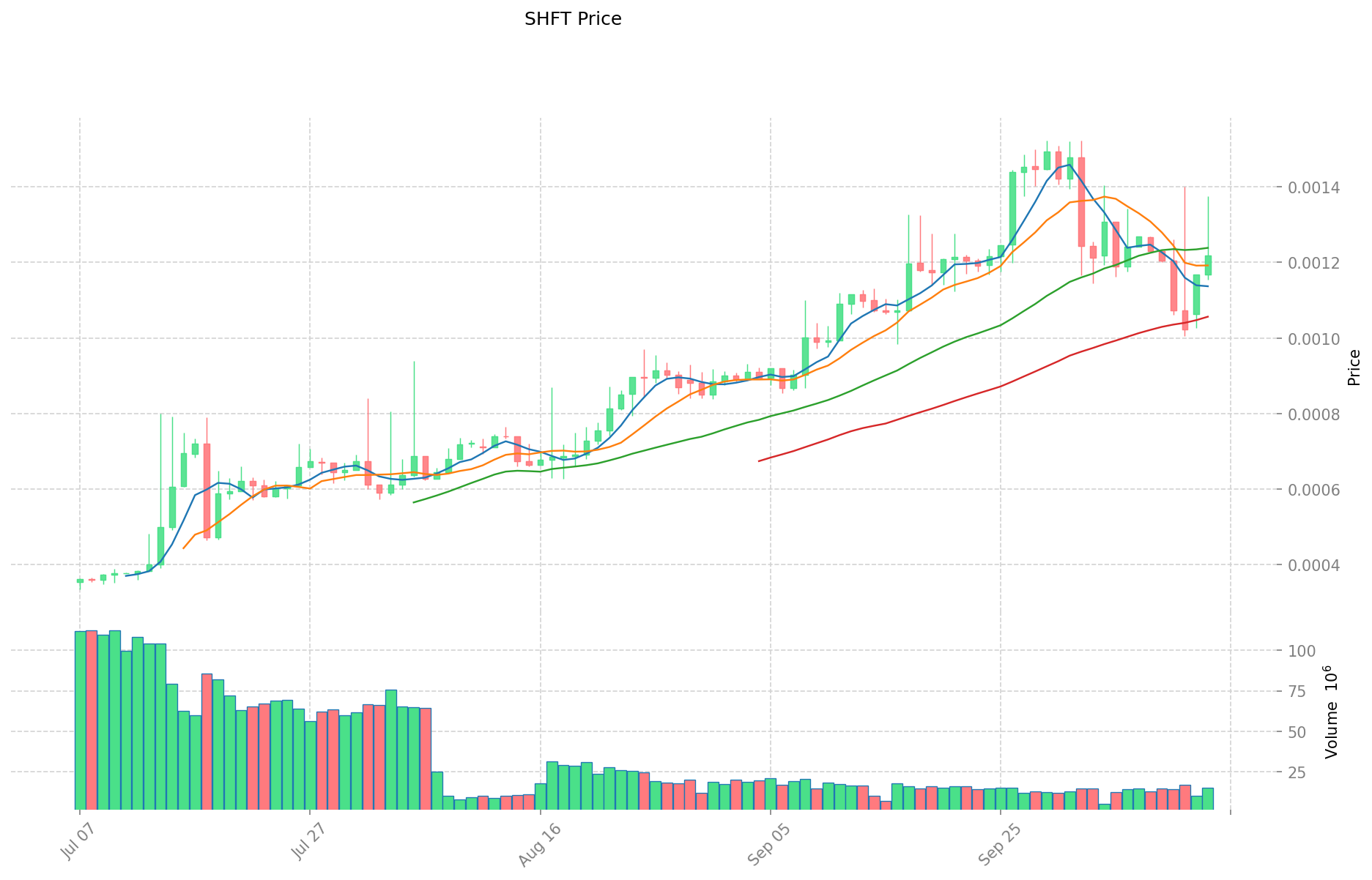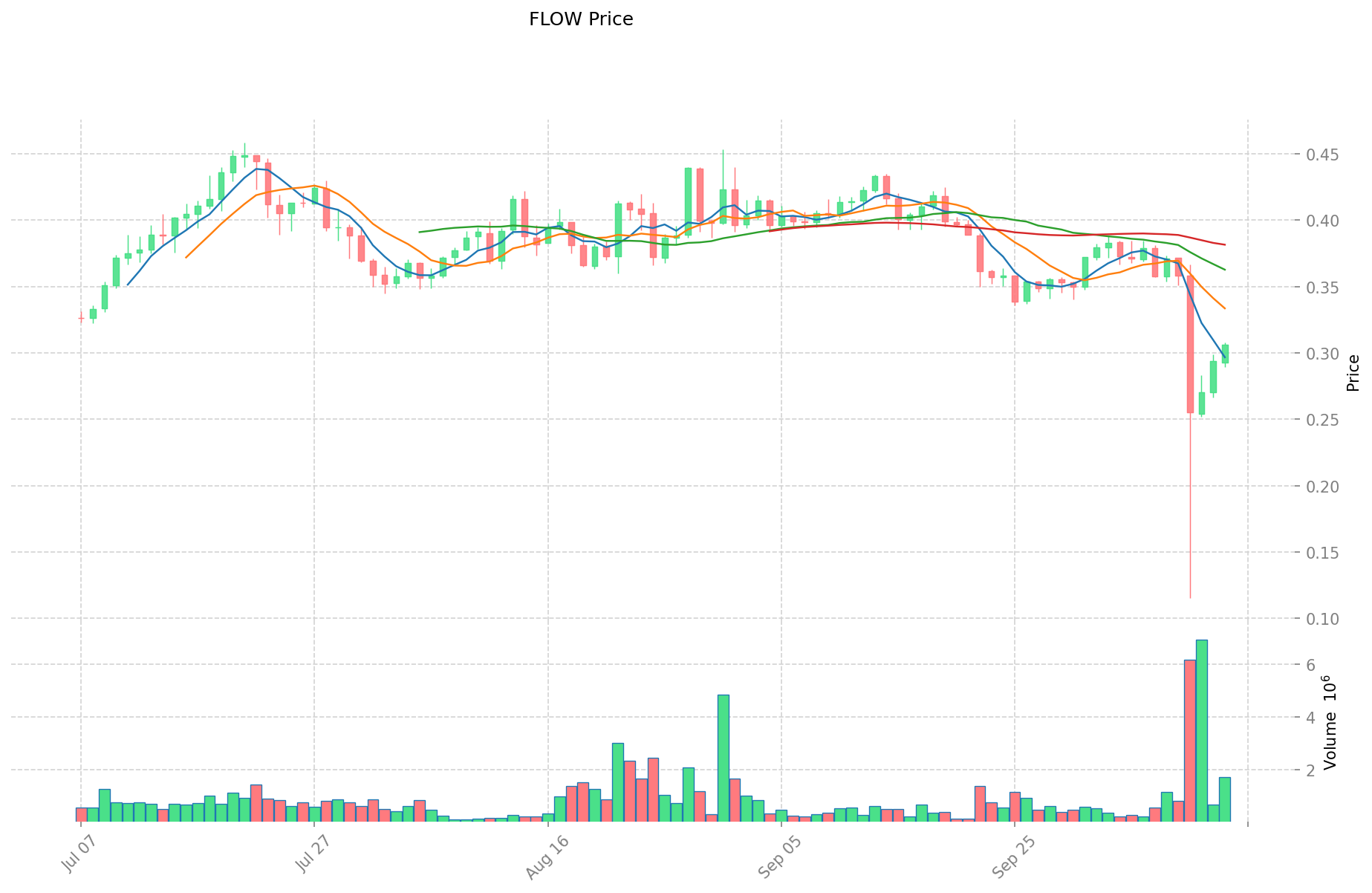SHFT vs FLOW: Geleceğin Merkeziyetsiz Uygulamaları İçin İki Yenilikçi Blockchain Platformunun Karşılaştırılması

Giriş: SHFT ve FLOW Yatırımlarının Karşılaştırılması
Kripto para piyasasında Shyft Network ile Flow’un karşılaştırılması, yatırımcılar için sürekli gündemde olan bir konudur. Bu iki proje, piyasa değeri sıralaması, kullanım alanları ve fiyat performansı açısından belirgin biçimde ayrışırken, kripto varlık alanında da farklı pozisyonlara sahiptir.
Shyft Network (SHFT): 2021’de piyasaya çıkışından bu yana, veri ekosistemlerinde güven ve kimlik doğrulama odaklı yaklaşımıyla piyasa tarafından tanınmıştır.
Flow (FLOW): 2020’de tanıtılan platform, yeni nesil oyunlar ve uygulamalar için öne çıkarak dijital varlıklar ve merkeziyetsiz uygulamalar alanında en çok tercih edilen blok zincirlerden biri olmuştur.
Bu makalede SHFT ile FLOW’un yatırım değerleri kapsamlı şekilde analiz edilecek; tarihsel fiyat seyri, arz mekanizması, kurumsal benimseme, teknolojik ekosistem ve gelecek tahminleri üzerinden yatırımcıların en çok merak ettiği soruya yanıt aranacaktır:
"Şu anda hangisi daha avantajlı bir alım?"
I. Fiyat Geçmişinin Karşılaştırılması ve Güncel Piyasa Durumu
SHFT (Coin A) ve FLOW (Coin B) Fiyat Geçmişi
- 2021: SHFT, 28 Mart 2021’de 6,34 ABD Doları ile en yüksek seviyesine ulaştı.
- 2021: FLOW, 5 Nisan 2021’de 42,4 ABD Doları ile zirveye çıktı.
- Karşılaştırmalı analiz: Zirvelerinden bu yana SHFT fiyatı 6,34 ABD Doları’ndan 0,0012176 ABD Doları’na, FLOW ise 42,4 ABD Doları’ndan 0,3067 ABD Doları’na geriledi.
Güncel Piyasa Durumu (14 Ekim 2025)
- SHFT güncel fiyatı: 0,0012176 ABD Doları
- FLOW güncel fiyatı: 0,3067 ABD Doları
- 24 saatlik işlem hacmi: SHFT 18.301,92 ABD Doları; FLOW 515.173,33 ABD Doları
- Piyasa Duyarlılık Endeksi (Korku & Açgözlülük Endeksi): 38 (Korku)
Canlı fiyatları görüntülemek için tıklayın:
- SHFT güncel fiyatı için Piyasa Fiyatı
- FLOW güncel fiyatı için Piyasa Fiyatı


II. SHFT ve FLOW Yatırım Değerini Etkileyen Temel Faktörler
Arz Mekanizması Karşılaştırması (Tokenomik)
- SHFT: Maksimum 8 milyon token ile sınırlı arz, madencilikle kademeli token oluşturma
- FLOW: Toplam 1.39 milyar token arzı ve önceden belirlenmiş dağıtım planı
- 📌 Tarihsel örüntü: SHFT gibi sabit arzlı tokenlar, piyasa yükselişlerinde kıtlık değeri yaratırken; FLOW’un kontrollü arzı ekosistem büyümesiyle fiyat istikrarını dengelemeye yöneliktir.
Kurumsal Benimseme ve Piyasa Uygulamaları
- Kurumsal portföyler: FLOW, Warner Music Group, NBA ve UFC gibi destekçileriyle daha fazla kurumsal ilgi görmektedir
- Kurumsal kullanım: FLOW, NFT, dijital koleksiyon ve oyun sektöründe güçlü örnekler sunarken; SHFT daha çok merkeziyetsiz uygulama alanına odaklanır
- Düzenleyici yaklaşım: Her iki token farklı ülkelerde farklı regülasyonlara tabidir; FLOW’un mevcut ortaklıkları, regülasyon açısından daha fazla netlik sunabilir
Teknik Gelişim ve Ekosistem Oluşumu
- SHFT teknik güncellemeleri: Shift tabanlı konsensüs mekanizması ve güvenli madencilik protokolü
- FLOW teknik gelişimi: Çoklu düğüm mimarisi ve ölçeklenebilirlik için özel düğüm türleri, geliştirici dostu ortam
- Ekosistem karşılaştırması: FLOW, önde gelen NFT projeleri (NBA Top Shot, UFC Strike) ve geliştirici araçları ile daha gelişmiş bir ekosisteme sahipken, SHFT henüz ana akım uygulamalar açısından daha sınırlıdır
Makroekonomik Ortam ve Piyasa Döngüleri
- Enflasyon performansı: SHFT gibi sınırlı arzlı tokenlar, teorik olarak enflasyon karşısında daha güçlü koruma sağlar
- Para politikası etkisi: Her iki token, genel kripto piyasası trendleri ve para politikası değişimlerine duyarlıdır
- Jeopolitik faktörler: FLOW’un kurumsal ortaklıkları istikrar sağlarken, SHFT jeopolitik belirsizlikte merkeziyetsiz çözümlere olan talep artışından faydalanabilir
III. 2025-2030 Fiyat Tahmini: SHFT ve FLOW
Kısa Vadeli Tahmin (2025)
- SHFT: Muhafazakar 0,00073044 - 0,0012174 ABD Doları | İyimser 0,0012174 - 0,001813926 ABD Doları
- FLOW: Muhafazakar 0,266568 - 0,3064 ABD Doları | İyimser 0,3064 - 0,453472 ABD Doları
Orta Vadeli Tahmin (2027)
- SHFT büyüme dönemine girebilir; tahmini fiyat aralığı 0,00086354899425 - 0,00197149864725 ABD Doları
- FLOW yükseliş piyasasına girebilir; tahmini fiyat aralığı 0,283812192 - 0,567624384 ABD Doları
- Temel etkenler: Kurumsal sermaye girişi, ETF’ler, ekosistem gelişimi
Uzun Vadeli Tahmin (2030)
- SHFT: Temel senaryo 0,002768277992531 - 0,003295035343336 ABD Doları | İyimser senaryo 0,003295035343336 - 0,003654126950141 ABD Doları
- FLOW: Temel senaryo 0,6267022568664 - 0,833514001632312 ABD Doları | İyimser senaryo 0,833514001632312 - 0,833514001632312 ABD Doları
Feragatname
SHFT:
| Yıl | Tahmini En Yüksek Fiyat | Tahmini Ortalama Fiyat | Tahmini En Düşük Fiyat | Artış Oranı |
|---|---|---|---|---|
| 2025 | 0,001813926 | 0,0012174 | 0,00073044 | 0 |
| 2026 | 0,00174301245 | 0,001515663 | 0,00086392791 | 24 |
| 2027 | 0,00197149864725 | 0,001629337725 | 0,00086354899425 | 33 |
| 2028 | 0,002682623097326 | 0,001800418186125 | 0,001188276002842 | 47 |
| 2029 | 0,003295035343336 | 0,002241520641725 | 0,001277666765783 | 83 |
| 2030 | 0,003654126950141 | 0,002768277992531 | 0,001688649575443 | 127 |
FLOW:
| Yıl | Tahmini En Yüksek Fiyat | Tahmini Ortalama Fiyat | Tahmini En Düşük Fiyat | Artış Oranı |
|---|---|---|---|---|
| 2025 | 0,453472 | 0,3064 | 0,266568 | 0 |
| 2026 | 0,56610464 | 0,379936 | 0,25075776 | 24 |
| 2027 | 0,567624384 | 0,47302032 | 0,283812192 | 54 |
| 2028 | 0,62959004592 | 0,520322352 | 0,3382095288 | 69 |
| 2029 | 0,6784483147728 | 0,57495619896 | 0,4427162731992 | 87 |
| 2030 | 0,833514001632312 | 0,6267022568664 | 0,526429895767776 | 104 |
IV. Yatırım Stratejisi Karşılaştırması: SHFT ve FLOW
Uzun Vadeli ve Kısa Vadeli Yatırım Stratejileri
- SHFT: Merkeziyetsiz güven ve kimlik doğrulama çözümlerine odaklanan yatırımcılar için uygundur
- FLOW: NFT, oyun ve dijital koleksiyon ekosistemlerinde yatırım yapmak isteyenler için uygundur
Risk Yönetimi ve Varlık Dağılımı
- Temkinli yatırımcılar için: SHFT %20, FLOW %80
- Agresif yatırımcılar için: SHFT %40, FLOW %60
- Koruma araçları: Stablecoin tahsisi, opsiyonlar, çapraz para portföyleri
V. Potansiyel Risk Karşılaştırması
Piyasa Riski
- SHFT: Düşük piyasa değeri ve işlem hacmi nedeniyle yüksek volatilite
- FLOW: Daha geniş NFT ve oyun piyasası trendlerine maruz kalır
Teknik Risk
- SHFT: Ölçeklenebilirlik ve ağ istikrarı
- FLOW: Düğüm merkezileşmesi ve olası güvenlik açıkları
Regülasyon Riski
- Küresel regülasyon politikaları iki tokenı farklı şekilde etkileyebilir; FLOW, öne çıkan ortaklıkları ve NFT odaklı yapısı nedeniyle daha fazla denetimle karşılaşabilir
VI. Sonuç: Hangisi Daha Avantajlı Bir Alım?
📌 Yatırım Değeri Özeti:
- SHFT’nin avantajları: Sınırlı arz, veri ekosistemlerinde güven ve kimlik doğrulama odaklı yapı
- FLOW’un avantajları: Güçlü ortaklıklar, olgun NFT ve oyun ekosistemi, yüksek likidite
✅ Yatırım Tavsiyesi:
- Yeni yatırımcılar: Daha oturmuş ekosistem ve ortaklıkları nedeniyle FLOW’u değerlendirin
- Tecrübeli yatırımcılar: SHFT ve FLOW arasında çeşitlendirme yapıp, FLOW ağırlıklı portföy oluşturun
- Kurumsal yatırımcılar: Güçlü kurumsal benimseme ve net kullanım örnekleri nedeniyle FLOW’a odaklanın
⚠️ Risk Uyarısı: Kripto para piyasaları yüksek volatiliteye sahiptir. Bu makale yatırım tavsiyesi değildir. None
VII. Sıkça Sorulan Sorular
S1: SHFT ve FLOW’un temel farkları nelerdir? C: SHFT, veri ekosistemlerinde güven ve kimlik doğrulama üzerine odaklanıp 8 milyon ile sınırlı token arzına sahiptir. FLOW ise yeni nesil oyunlar ve uygulamalar için tasarlanmıştır, toplam 1,39 milyar token arzı ve NFT ile dijital koleksiyonlarda daha gelişmiş bir ekosisteme sahiptir.
S2: Tarihsel olarak hangi token daha iyi performans gösterdi? C: İki token da 2021’deki zirvelerinden bu yana önemli fiyat düşüşleri yaşamıştır. FLOW, daha yüksek fiyat ve piyasa değeriyle, daha fazla işlem hacmi ve güçlü kurumsal benimsemeye sahiptir.
S3: SHFT ve FLOW’un arz mekanizmasında farklar nedir? C: SHFT, madencilikle kademeli token oluşturma ve sınırlı arz ile kıtlık değeri yaratabilir. FLOW ise önceden belirlenmiş dağıtım takvimiyle daha büyük bir arz sunup, ekosistem büyümesi ile fiyat istikrarı hedefler.
S4: Hangi token daha güçlü kurumsal benimsemeye sahip? C: FLOW, Warner Music Group, NBA ve UFC gibi destekçileriyle daha fazla kurumsal ilgi görmektedir. Ayrıca NFT, dijital koleksiyon ve oyun alanlarında daha güçlü kurumsal kullanım örnekleri sergiler.
S5: SHFT ve FLOW’un yatırım değerini etkileyen ana faktörler nelerdir? C: Arz mekanizması, kurumsal benimseme, piyasa uygulamaları, teknik gelişim, ekosistem büyümesi, makroekonomik ortam ve piyasa döngüleri başlıca etkenlerdir.
S6: SHFT ve FLOW için uzun vadeli fiyat tahminleri nasıl karşılaştırılır? C: 2030 için SHFT’nin temel senaryosu 0,002768277992531 - 0,003295035343336 ABD Doları aralığını öngörürken, FLOW’un temel senaryosu 0,6267022568664 - 0,833514001632312 ABD Doları aralığını öngörmektedir. Uzun vadede FLOW’un daha yüksek potansiyel fiyatlara ulaşması beklenir.
S7: Farklı yatırımcı tipleri için hangi token daha avantajlı bir alım olarak görülüyor? C: Yeni yatırımcılar için FLOW, daha oturmuş ekosistem ve ortaklıkları sayesinde önerilmektedir. Tecrübeli yatırımcılar SHFT ve FLOW arasında çeşitlendirme yaparak, FLOW ağırlıklı portföy oluşturabilirler. Kurumsal yatırımcılar ise güçlü kurumsal benimseme ve net kullanım örnekleri nedeniyle FLOW’a odaklanmalıdır.
S8: SHFT ve FLOW yatırımlarında başlıca riskler nelerdir? C: Her iki token piyasa, teknik ve regülasyon riski taşır. SHFT, düşük piyasa değeri ve işlem hacmi nedeniyle daha yüksek volatiliteye sahipken; FLOW, NFT ve oyun piyasası trendlerine daha fazla maruz kalır. Regülasyon politikaları her iki tokenı farklı şekillerde etkileyebilir; FLOW, öne çıkan ortaklıkları ve NFT odaklı yapısı nedeniyle daha fazla denetim riskiyle karşılaşabilir.

XEM vs FLOW: Blockchain Teknolojisi ile Dijital Varlık Yönetiminde İki Özgün Yaklaşımın Karşılaştırılması

MANEKI ve ENJ: İki Blockchain Oyun Ekosistemini Karşılaştırmak ve Dijital Varlık Sahipliği Üzerindeki Etkilerini Değerlendirmek

AVT ve FLOW: NFT ekosisteminde önde gelen iki dijital varlık protokolünün karşılaştırılması

2025 WAXP Fiyat Tahmini: Blockchain Oyun Sektöründeki Yükselişle Birlikte İyimser Beklentiler

WMTX ile ENJ: İki Lider Blockchain Oyun Platformunun Karşılaştırılması

AWE ve ENJ: Blockchain tabanlı oyun sektörünün iki öncü platformunun karşılaştırılması

Dropee Günlük Kombinasyonu 11 Aralık 2025

Tomarket Günlük Kombinasyonu 11 Aralık 2025

Merkeziyetsiz Finans'ta Geçici Kayıp Nedir?

Kripto Parada Çifte Harcama: Önleme Stratejileri

Kripto Ticaretinde Wyckoff Yönteminin Anlaşılması





